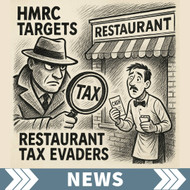Nearly 100 Eateries Named for £10m in Unpaid Tax
Posted by Emily on 21st Jul 2025 Reading Time:
HMRC has intensified its efforts to combat tax evasion within the hospitality sector by naming and shaming 98 restaurant and takeaway businesses for failing to pay a combined total of £10.4 million in tax. The move, part of a broader campaign to increase compliance and transparency, highlights growing scrutiny of the restaurant industry—a sector HMRC has long treated with suspicion due to its high volume of cash transactions and susceptibility to accounting irregularities.
Electronic Sales Suppression and Cash-In-Hand Practices
The crackdown primarily targets businesses engaged in Electronic Sales Suppression (ESS)—a form of till fraud where digital tools are used to manipulate sales data, effectively under-reporting income and evading tax obligations. HMRC has issued £9.2 million in penalties related to ESS and other forms of non-compliance, with a particular focus on operations that have routinely paid staff in cash to sidestep payroll taxes.
Named offenders include:
- A La Turka (Grimsby): £492,000 in unpaid taxes and penalties.
- Uncle Sam’s (Cardiff): £650,000 owed.
- Chilli Sizzler (Peterborough): £88,000 in liabilities.
Philip Kinzett-Evans, a partner at UHY Hacker Young, noted that restaurants and takeaways are “easy targets for HMRC,” especially as many in the industry fail to seek proper tax advice. “With inflation squeezing margins and competition fierce, it’s tempting to cut corners—but the risks are immense, ranging from severe financial penalties to criminal prosecution,” he said.
Government Pressure, Growing Investigations
The aggressive enforcement comes as HMRC responds to government-imposed targets to ramp up tax investigations. According to law firm Pinsent Masons, the Treasury has mandated an increase in the number of tax investigators, aiming to boost revenues without raising headline tax rates. As a result, the tax authority is intensifying audits and compliance checks across the board.
“Individuals and companies are likely to face even greater scrutiny in the next 12 months,” warned Abigail McGregor, Legal Director at Pinsent Masons. The government’s strategy of raising funds through enforcement rather than new taxation has led to a sharp rise in Corporation Tax collection—from £12.4 billion to £14.2 billion in the last financial year.
Industry Pushback and Sector Struggles
The timing of this crackdown has not gone unnoticed by the hospitality industry, which remains under immense pressure following the pandemic. The sector continues to grapple with soaring energy costs, subdued consumer spending, and staffing crises. More than 70,000 jobs have been lost in hospitality in just the past three months.
Peter Davies, client services partner at Moore Kingston Smith, described HMRC’s campaign as “the last thing restaurants need” during such a precarious time. He added, “Restaurant businesses are closing every week. A compliance blitz only adds to the burden.”
This sentiment is echoed by UK Hospitality chief executive Kate Nicholls, who stated that the sector is struggling to recover and “cannot afford to recruit for summer,” calling the situation “worse than Covid.” The organisation recently launched the #TaxedOut campaign to reverse policy decisions that have intensified financial strain on hospitality operators.
What’s Next for Operators?
HMRC’s focus is expected to extend beyond ESS and undeclared wages. Compliance officers are likely to examine a broader range of operational practices, including:
- Adherence to new tipping legislation.
- Payment of the National Minimum Wage.
- Correct reporting of sales through delivery platforms.
As Peter Davies cautions, “Even if HMRC visits to investigate one issue, they won’t ring-fence it. They’ll use the opportunity to examine every part of the business.”
The message from HMRC is clear: no operator is beyond reach. While the crackdown aims to level the playing field, its timing and intensity have sparked significant concern in an industry that is still recovering.




